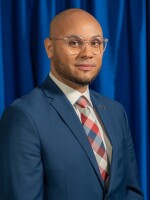An overcast Tuesday drew scattered voters for Hazleton elections but plenty of concerns from Latino voters about civic engagement, representation and the city's future.
Despite the significant races featuring Latino candidates for City Council and a government study commission, polling locations across Hazleton reported historically low turnout of all voters.
At the Lackawanna College polling site, only 66 voters of more than 1,100 registered had cast ballots by mid-afternoon.
“This is an important election, and it’s a shame people don’t realize it,” said Dee Deakos, the poll's judge of elections. “We’re not even at 10% turnout. Local elections affect your schools, your streets, your taxes—your daily life.”
While national races attract crowds, the vote Tuesday centered on issues that strike closer to home: property taxes, local governance, education equity and representation. The government study commission race holds the potential to redefine Hazleton’s charter through “home rule”— a change that could enable local leaders to bypass state-imposed tax limits and create district voting for council members.
David Dominguez, a candidate for City Council and the study commission, voiced concerns about voter access and civic fatigue.
“We’ve done everything we could to get people motivated,” he said. “But posters were taken down, and at some polling places, there were no signs or directions at all. People walked away thinking the polls were closed.”
Dominguez specifically referenced issues at Heights Plaza, where he said confusion and lack of signs discouraged participation.
“I stood there for an hour and only saw one Hispanic voter. Two others left thinking the place wasn’t open,” he said.
Beyond access, deeper tensions emerged around representation.
“There’s this narrative that Hispanics don’t vote—and sadly, the numbers today seem to support that,” said Dominguez. “But we can change that. We have more young volunteers this time than ever before. We’re building something.”
Still, systemic hurdles persist. Deakos recalled past Latino candidates with strong credentials who failed to get elected.
“I vote based on the person, not their nationality,” she said. “But many voters don’t. And some Latino candidates couldn’t even gather enough signatures to get on both party lines because of fear and stigma.”
At the Lackawanna College polling station, voter Franklyn Núñez expressed cautious optimism.
“I’ve seen a lot of people moving around. There’s excitement. People are voting. We’re all hoping for a better future for our city,” he said. “But more importantly, we need unity. If we want growth, we need to work together—because we all live in this community.”
When asked about Latino turnout, Núñez noted, “So far, I’ve seen more Hispanic voters here. That’s a good sign. But we still need more participation.”
In other parts of Hazleton, the atmosphere was similarly hopeful.
“I think the energy is high,” said María Méndez, a voter interviewed outside the Vine Street poll. “It’s been a little slow, but people are coming out. What matters is that we all use our right to vote. It’s the most powerful tool we have.”
Méndez expressed optimism that results would reflect “a step forward for our community.”
“It’s not just about casting a ballot,” Dominguez said. “It’s about building a community that shows up, speaks up, and gets a seat at the table.”


